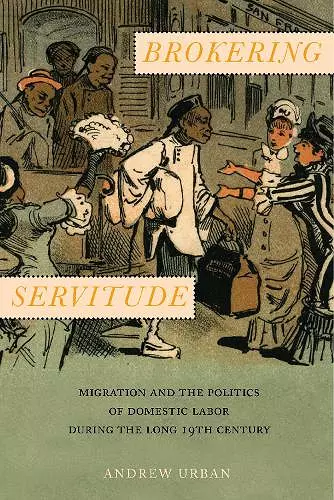Brokering Servitude
Migration and the Politics of Domestic Labor during the Long Nineteenth Century
Format:Hardback
Publisher:New York University Press
Published:26th Dec '17
Currently unavailable, and unfortunately no date known when it will be back

The history of domestic labor markets in 19th century America
From the era of Irish Famine migration to the passage of quota restrictions in the 1920s, household domestic service was the single largest employer of women in the United States, and, in California, a pivotal occupation for male Chinese immigrants. Servants of both sexes accounted for eight percent of the total labor force – about one million people. In Brokering Servitude, Andrew Urban offers a history of these domestic servants, focusing on how Irish immigrant women, Chinese immigrant men, and American-born black women navigated the domestic labor market in the nineteenth century – a market in which they were forced to grapple with powerful racial and gendered discrimination.
Through vivid examples like how post-famine Irish immigrants were enlisted to work as servants in exchange for relief, this book examines how race, citizenship, and the performance of domestic labor relate to visions of American expansion. Because household service was undesirable work stigmatized as unfree, brokers were integral to steering and compelling women, men, and children into this labor. By the end of the nineteenth century, the federal government became a major broker of domestic labor through border controls, and immigration officials became important actors in dictating which workers were available for domestic labor and under what conditions they could be contracted.
Drawing on a range of sources – from political cartoons to immigrant case files to novels – Brokering Servitude connects Asian immigration, European immigration, and internal, black migration. The book ultimately demonstrates the ways in which employers pitted these groups against each other in competition for not only servant positions, but also certain forms of social inclusion, offering important insights into an oft-overlooked area of American history.
Historian Urban (Rutgers) examines worker servitude in the urban economy of the US between 1850 and 1924[He] demonstrates how gender and race delineated the experiences of individuals as they encountered complexities of the broader national economy. Urban skillfully draws on personal stories, private papers, public records, popular journalism and cartoons, and more. For scholars and students seeking historical perspective on current public debates in the US. * Choice *
Revealing the intimate links between race, gender, and state power, Brokering Servitude illustrates how seemingly contradictory aims – legal freedom and economic coercion, humanitarian protection and exploitative opportunism, immigration restriction and labor recruitment – operated hand in hand to commodify, transport, and manage domestic labor from the 1850s to the 1920s. -- Pacific Historical Review
Brokering Servitude speaks to modern debates about citizenship, guestworkers, and immigration... this book cuts across disciplinary boundaries and will interest scholarly as well as non-academic audiences. * Recensions *
A dazzling reassessment of the history of domestic service. In this sophisticated study, Urban links American middle-class homes to global as well as internal labor markets, persuasively recasting missionaries, abolitionists, and government officials as labor brokers. Brokering Servitude unravels simple dichotomies between free and unfree labor, inclusion and exclusion, bondage and contract, home and world. With subtlety and sensitivity, Urban relates the interlocking histories of people whose stories are usually told separatelyAfrican American, Chinese, and Irish servantswhile remaining attentive to the ways in which their coexistence produced racial difference. In the process, he offers a compelling answer to a vital question: How do certain people come to serve others? -- Wendy Gamber,Indiana University
Andrew Urban has written the book on domestic service for our times by complicating conventional divisions between free and unfree labor, coercion and contract, protection and exploitation, and the home and the workplace. Through skillful vignettes and deep research, we experience Castle Garden and shipside inspections of European women, the brokering of the Freemens Bureau, the tussle over sureties and temporary entrance of Chinese in the era of exclusion, and the ways that Empire, settler colonialism, racial capitalism, and migration shaped the value of domesticity. -- Eileen Boris,Hull Professor of Feminist Studies, University of California, Santa Barbara
Andrew Urban places servants at the center of his illuminating book, examining Irish, African American, and Chinese domestic servants in the decades between 1850 and 1924and the brokers who commodified and managed them. The book explores the complexities of race, gender, free and unfree labor, and empire, while never losing sight of the migrants who struggled to negotiate their lives and labor. This splendid study will help us rethink a crucial period of transformation. -- Julie Greene,Founding Co-Director, Center for Global Migration Studies, University of Maryland at College Park
Brokering Servitude provides a well-researched historical perspective on the role of intermediaries in supplying and leveraging domestic labor in U.S. households during the mid-nineteenth and early twentieth centuries.” * Journal of Asian American Studies *
ISBN: 9780814785843
Dimensions: unknown
Weight: 680g
352 pages